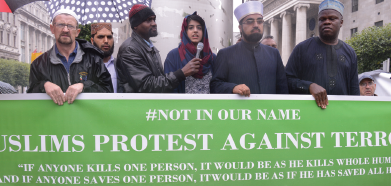Freda Hughes speaks to Shaykh Umar Al-Qadri of the Irish Muslim Peace and Integration Council about their battle again religious extremism, intolerance and Islamophobia.
On 26th July a predominantly Muslim crowd gathered on a rain-soaked O’Connell Street in Dublin to protest atrocities carried out by ISIS.
The protest’s theme was “Not In Our Name”, and organisers handed out placards with slogans such as “Foreign Policy and Injustice are Prime Motivators for Radicalisation” and “UK and US Should Stop Helping Terrorists by Selling Them Weapons”.
The event was organised by the Irish Muslim Peace and Integration Council (IMPIC), a group set up to address the needs of a young and growing Muslim community in Ireland.
Shaykh Umar Al-Qadri says the Council aims to promote integration and a wider appreciation of Islam to combat growing Islamophobia, and to tackle religious extremism, a scourge they see as affecting Muslim communities in many European states.
Shaykh Al-Qadri spoke about a recent IMPIC event, a community Iftar dinner during Ramadan, which had Holocaust survivor Tomi Reichental as its guest of honour. He described their meeting as phenomenal, stressing the importance of interfaith dialogue in a time of rising hatred and bigotry.
IMPIC launched a ‘Declaration of Peace and Guide to Prevent Radicalisation’ this summer.
“Islam says to build positive relationships and we are trying to revive that message,” says Al-Qadri, adding: “We want to give a voice to the silent majority. The vast majority of Muslims abhor the acts of the so-called Islamic State, but often they don’t realise why it is important to speak out against extremism and acts of terror. We must wake them up and shake them up! It is not enough to silently or privately condemn. We must speak out.”
The protest was held following the terror attack in Tunisia which left 38 people dead, three of them Irish citizens.
Every single drone attack is actually creating more terrorists
Al-Qadri attended the funerals of all three Irish victims after which he says he realised the need to not only condemn the atrocities during Friday prayers, but to take to the streets and tell people that “this is not our Islam. We are absolutely against the so-called Islamic State and other such groups.”
He said that some Muslim leaders were reluctant or didn’t see the protest as a good idea, but many leaders from Ireland’s Muslim community got involved.
The event was entirely Muslim-led, so some people were surprised to see a woman, Kashmira Zahoor, host proceedings.
Al-Qadri says it sent a strong message that “these people do not act in the name of our faith, despite what they call themselves.”
Al-Qadri says that ISIS, and indeed, many militant groups, often deliberately misquote or misinterpret religious texts to justify their atrocities.
He says that while there are indeed theological issues at play, one of the main reasons for the existence and growth of ISIS is injustice, often Western-instigated or supported, in many Muslim-majority countries.
“Every single drone attack is actually creating more terrorists. If we want to annihilate ISIS and terrorism perpetrated in the name of Islam, we need to stop giving it the oxygen it needs to survive.
Invasions, injustice, discrimination and stereotyping the Muslim community is the oxygen they use to recruit vulnerable people. One of the major reasons that ISIS and others exist are the injustices and certain grievances of the Muslim world against the West particularly in the Middle East.”
He cites the ongoing Israeli occupation of Palestine, Western invasions and attacks on Iraq, Afghanistan, Libya, and the horrific situation in Syria as examples of ongoing injustices which “create the anger and frustration utilised by extremists to recruit vulnerable youth.”
“The actions of ISIS cannot be justified using Islam. ISIS has nothing to do with Islam, but if we want to really get rid of religious extremism we must look at the root causes. The vast majority know that these acts can never be justified. What we need to do is be honest about the root causes behind people choosing to become extremists. Unless these are addressed, we can never really get rid of extremism,” Al-Qadri said.
The IMPIC initiative has been well received so far within the Muslim community with workshops held in mosques to tackle extremism and to create awareness around the misinterpretation and misuse of religious texts.





